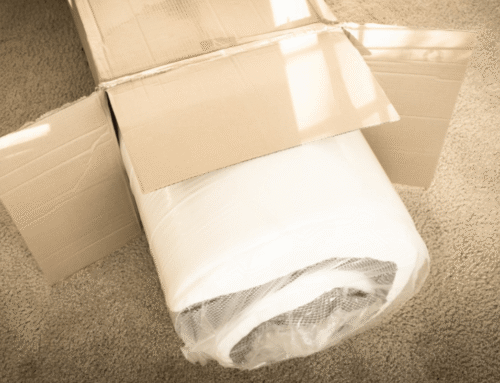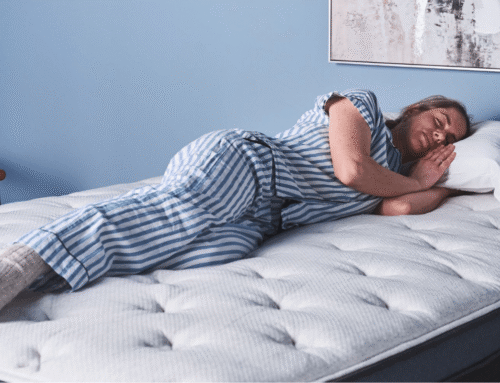Shopping for a mattress? Firmness affects how comfortable you feel and whether you wake up rested or sore. A medium firm mattress has a balance of softness and support, and works well if you move around at night. A firm mattress feels sturdier and keeps your spine aligned, which can help if you sleep on your back or stomach.
Some people like medium firm since it allows a little sink without feeling too soft. Others prefer firm since it keeps the body from sinking too much, which may help with back pain. Your sleep position and body type play a big role, so testing both can help you decide.
We’ll break down the differences between medium firm and firm mattresses, their benefits, and how to choose the right one. Whether you need more support or a bit more cushioning, knowing what works for your body helps you sleep better.
Key Takeaways
- Medium firm mattresses combine comfort with support. They have enough cushioning to relax muscles and keep the spine aligned, which makes them suitable for back and side sleepers.
- Firm mattresses prevent the body from sinking too deeply and provide better support for stomach and back sleepers.
- Medium firm options suit couples well. They minimize motion transfer and support various sleep positions, so both partners can rest comfortably.
- Firm mattresses may ease back pain. They promote spinal alignment and reduce pressure on sensitive areas, which helps improve comfort.
- Mattress firmness can be adjusted. Toppers, regular rotation, or adjustable bed frames provide effective ways to modify comfort levels.
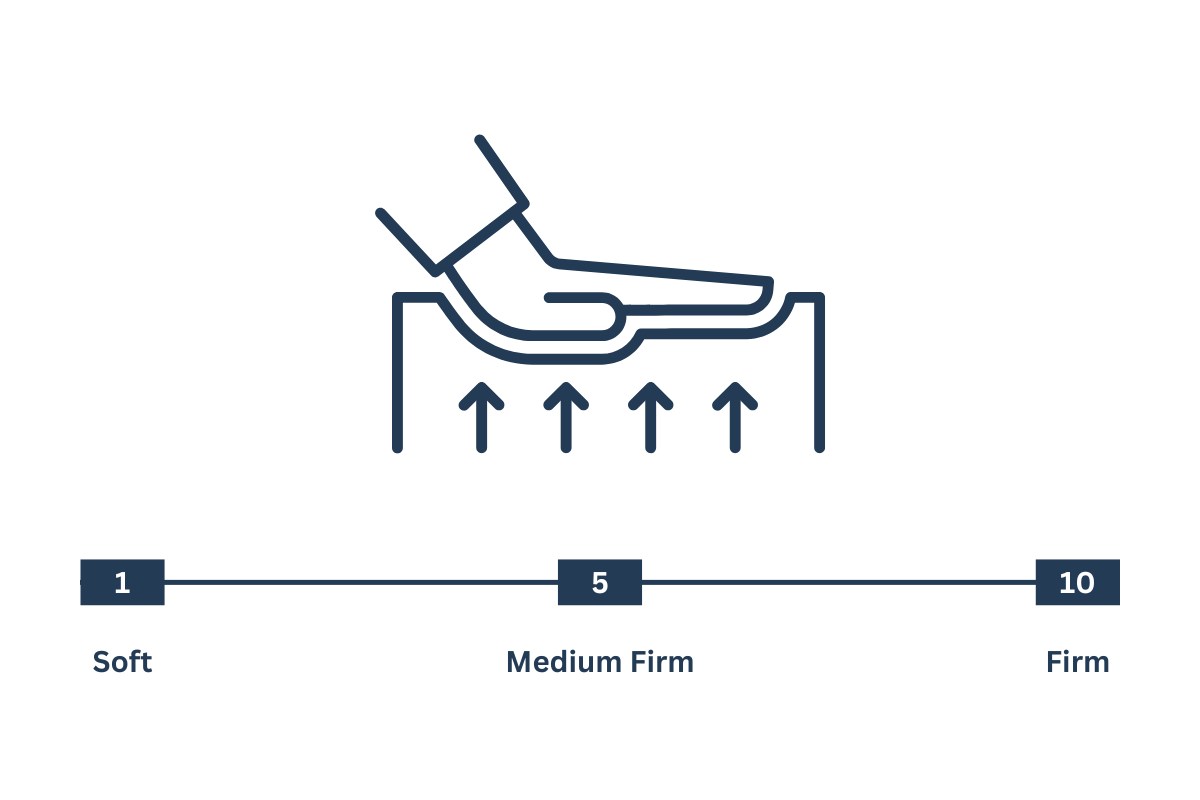
What Is a Medium Firm Mattress?
What exactly is a medium firm mattress, how does it feel, and how firm is it? A medium firm mattress lands between soft and firm, usually rated around 5 to 7 out of 10 on the firmness scale. It provides a mix of cushioning and support and keeps your body aligned without feeling too stiff or too plush. This level works well if you switch between sleeping on your back and side.
You get enough softness to relieve pressure on your shoulders and hips while still feeling supported around your lower back. It avoids that sinking feeling softer beds can cause but doesn’t feel as rigid as a firm mattress. This balance makes it a solid choice for couples with different sleep preferences.
Most body types find this firmness comfortable, though heavier sleepers might prefer extra support from a firmer option. It also helps if you wake up with aches and need a mattress that cushions pressure points without feeling too soft. Memory foam, latex, and hybrid designs all come in medium firm, so there’s plenty of variety to match your comfort needs.
Benefits of a Medium Firm Mattress
A medium-firm mattress gives a nice mix of support and comfort. There’s enough cushioning to keep you cozy, but you won’t sink too deep or wake up with a stiff back. Your spine stays in a neutral position, so you feel well-rested instead of achy. It also helps with pressure relief, especially if you sleep on your side. Too soft, and your shoulders and hips press down too much. Too firm, and those areas take all the weight. A medium-firm feel keeps things balanced, so you wake up without soreness.
This level of firmness works for different sleep positions. Back sleepers get steady support, side sleepers avoid too much pressure, and combination sleepers can move without struggling. Sharing a bed feels easier since both people stay comfortable without big adjustments.
Who Should Choose a Medium Firm Mattress?
When choosing the right mattress, you may wonder if a medium firm mattress suits your needs. Is a medium firm mattress good for side sleepers, back pain, and other concerns? The answer is yes, it strikes a balance of support and softness, which is ideal for various sleeping preferences.
- Side sleepers needing support and softness: You want a mattress that cushions pressure points without losing support. Medium firm gives just enough sink for your shoulders and hips while keeping your spine in a neutral position. Too soft can throw off alignment, and too firm may feel harsh on joints.
- Back sleepers wanting stability with comfort: A mattress that’s overly soft can cause lower back strain, while one that’s too firm may feel unforgiving. Medium firm provides the right mix, offering lumbar support without feeling rigid. You get enough cushioning to relax without waking up sore.
- Couples with different sleeping styles: Sharing a bed with different sleep preferences can be a challenge. Medium firm works for a range of body types, so both partners get a good balance of comfort and support. It also helps with motion isolation, so one person’s movements don’t disrupt the other’s sleep.
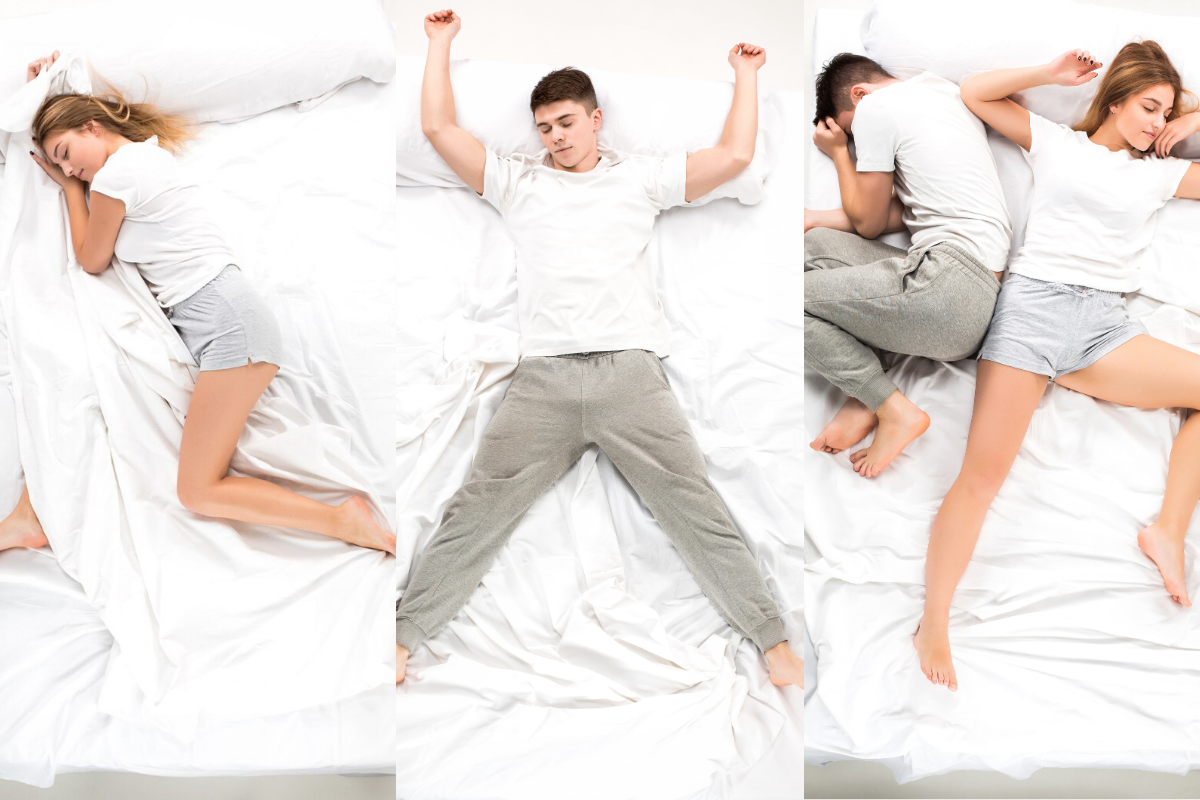
Medium Firm vs Firm Mattress: Key Differences
Which is better? A medium or medium firm mattress? Ultimately, it depends on your sleeping style and what you prioritize in comfort and support.A medium firm mattress gives a mix of cushioning and support, and keeps pressure points from feeling too stiff. It works well for most sleep positions, especially if you switch between your back and side. A firm mattress feels denser with less give and helps your body stay aligned without much sinking.
For pressure relief, a medium firm mattress contours better to the shoulders and hips, which helps with side and back sleeping. A firm mattress keeps the body lifted with less sinkage, so it works well for stomach sleepers or anyone needing extra lower back support.
Motion isolation tends to be better in a medium firm mattress since the added cushion absorbs movement. A firm mattress still limits motion transfer but feels a bit more responsive, which might be noticeable if you share a bed with someone who moves a lot.
Can You Make a Firm Mattress Softer or a Medium Firm Mattress Firmer?
Tweaking the feel of your mattress doesn’t always mean replacing it. A few simple adjustments can change how it supports your body.
- Use a Mattress Topper – A plush memory foam topper adds softness to a firm mattress, while a denser latex topper boosts support for a medium firm one.
- Rotate or Flip the Mattress – Some mattresses have dual firmness, so flipping or rotating can give a different feel. Even if there’s no dual-side design, rotation helps even out wear.
- Adjust the Bed Frame – An adjustable base can change the angle of your mattress, which affects firmness and support. A slight incline may relieve pressure, while a flat surface keeps it steady.
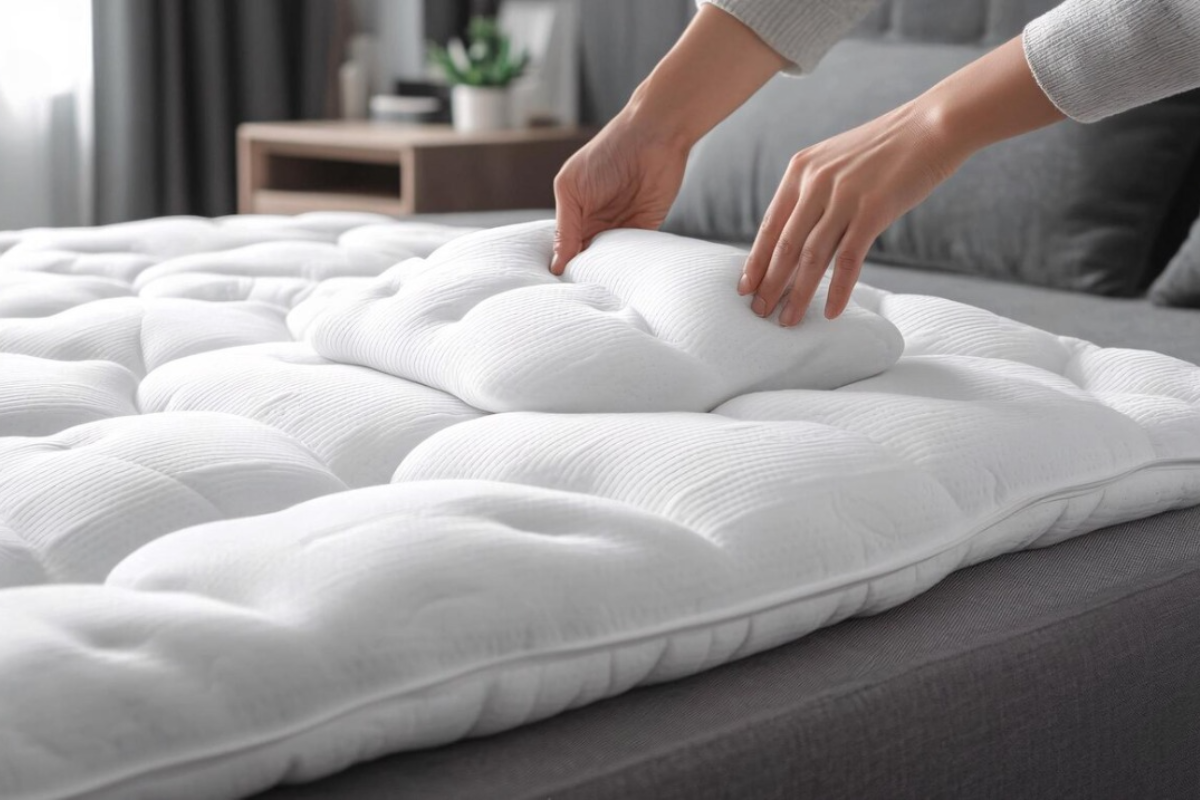
Choose a Medium Firm Mattress If:
A medium-firm mattress works well if you sleep on your side or back and gives you a good mix of comfort and support. It cushions pressure points like your shoulders and hips while keeping your spine aligned. Too soft can lead to sinking, and too firm might not feel comfortable for long hours of sleep.
If you prefer a bed that feels stable without being too stiff, this is a solid choice. There’s enough softness to ease tension but still enough support to keep you from feeling stuck. Switching positions feels natural, which helps if you alternate between sleeping on your side and back.
Sharing a bed? A medium-firm feel absorbs movement better, so you’re less likely to be disturbed when your partner shifts around. It keeps both sleepers comfortable without feeling too rigid or too plush, which is a practical option for different sleep preferences.
Choose a Firm Mattress If:
Sleep on your stomach or back and need proper support. A firmer surface keeps your spine aligned, so you don’t wake up with stiffness. Softer beds can cause sinking, which throws off posture and leads to discomfort.
Prefer a sturdy feel instead of sinking into the bed. A firm mattress keeps you on top of the surface rather than cradled inside. This helps with ease of movement, so turning over doesn’t feel like a struggle. It also provides a consistent feel throughout the night, so you’re not constantly adjusting for support.
Weigh more and need something that holds up over time. A firm mattress resists sagging and maintains its shape better under extra weight. It also distributes pressure evenly and prevents that stuck feeling softer beds can give.
Which Mattress Is Better for Back Pain?
A medium-firm mattress gives a good mix of comfort and support if lower back pain is a problem. It keeps the spine from sinking too much while still feeling cushioned. Too much softness can throw off alignment, and extra firmness may put pressure on sore areas.
For spinal alignment issues, a firm mattress helps keep the back in a neutral position. It stops the hips and shoulders from sinking too far, which can strain the spine. Side sleepers might find it too stiff, but back and stomach sleepers usually feel more stable.
Personal preference matters, but comfort shouldn’t come at the cost of support. If waking up sore is a daily issue, testing different firmness levels could help. Some brands offer trial periods, so you can see what works without committing immediately.

Choosing the Right Mattress for You
What is the difference between a plush and medium firm mattress, and which is best for you? A medium firm or medium soft? If you’re deciding between these options, understanding their feel and support can help you choose the right fit for your sleep needs.
Is a medium firm mattress good for you? A firm mattress gives solid support, which helps if you sleep on your back or stomach. It keeps your spine aligned and prevents sinking, so you don’t wake up with back pain. If you want a little cushion without losing support, medium firm adds just enough softness while still feeling stable.
Side sleepers usually prefer medium firm since it cushions the shoulders and hips. A mattress that feels too stiff can create pressure points and cause discomfort. Heavier sleepers might lean toward firm support since a softer surface can sink too much over time.
Comfort is personal, so testing different options helps. Some people like a firmer feel for stability, while others need extra softness to ease joint pain. If you’re unsure, medium firm is a safe bet since it balances comfort and support for most sleep styles.
Final Thoughts
A medium firm mattress has a good mix of softness and support, which feels comfortable for side and back sleepers. It helps reduce pressure on shoulders and hips, so you wake up without stiffness. Couples often like it since it absorbs movement, so restless sleep won’t be as disruptive.
A firm mattress feels more solid and holds up better under more weight, which works well for stomach sleepers and back sleepers who need extra support. It keeps the spine in a neutral position, helping with lower back pain. If you prefer sleeping on top of the mattress instead of sinking in, this might be a better fit.
Trying both firmness levels in a store or choosing one with a sleep trial helps you figure out what feels right. Comfort depends on body type and sleep habits, so personal preference matters most. A good mattress supports your body, helps you sleep better, and leaves you feeling refreshed in the morning.



